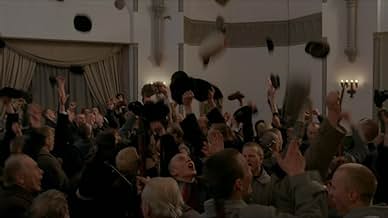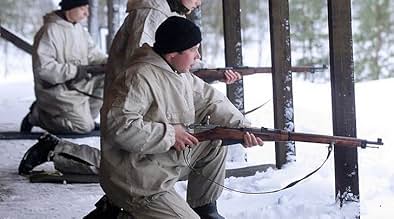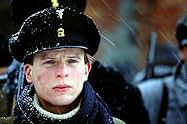PUNTUACIÓN EN IMDb
7,0/10
2,4 mil
TU PUNTUACIÓN
Añade un argumento en tu idiomaThis movie is about the Estonian War of Independence (1918-1920), specifically the students fighting on the nationalist side, but also shown the conflict between two ideologies (Estonian nat... Leer todoThis movie is about the Estonian War of Independence (1918-1920), specifically the students fighting on the nationalist side, but also shown the conflict between two ideologies (Estonian nationalism and communism).This movie is about the Estonian War of Independence (1918-1920), specifically the students fighting on the nationalist side, but also shown the conflict between two ideologies (Estonian nationalism and communism).
- Dirección
- Guión
- Reparto principal
- Premios
- 1 nominación en total
Hele Kõrve
- Marta
- (as Hele Kõre)
Bert Raudsep
- Käämer
- (as Bert Raudsepp)
Reseñas destacadas
The story is set in 1919, just after WWI has ended and the reds took over half of Europe. I wouldn't call them Russians, as you'll find out from the movie, that besides Russians there were Latvians and even Estonians in the red army. Unfortunately history repeats itself, in war it happens that brother fights against brother, or blood against blood.
It's a patriotic movie, of course. Estonians, as many other nations in the world fought for their freedom. What I liked in this movie is that it gave back very well the atmosphere of that time (excellent photography, and CGI perhaps) and also depicted very nicely the Estonian coutryside. Watching this movie I felt the urge to visit this country. Also liked very much that the film didn't want to make heroes. In contrary, it showed the weekness of these young students, the fear they felt being in war, killing other people. They were just victims of the war.
I bet this is one of the highest budgeted Estonian movies. But still very low budgeted comparing to American movies of the same category. So don't expect the same war scenes. However I liked it, as it is.
Only thing I can criticize in this movie is that the story is a bit too simple, too obvious. That's why I rated it 7/10. However it's an outstanding movie.
It's a patriotic movie, of course. Estonians, as many other nations in the world fought for their freedom. What I liked in this movie is that it gave back very well the atmosphere of that time (excellent photography, and CGI perhaps) and also depicted very nicely the Estonian coutryside. Watching this movie I felt the urge to visit this country. Also liked very much that the film didn't want to make heroes. In contrary, it showed the weekness of these young students, the fear they felt being in war, killing other people. They were just victims of the war.
I bet this is one of the highest budgeted Estonian movies. But still very low budgeted comparing to American movies of the same category. So don't expect the same war scenes. However I liked it, as it is.
Only thing I can criticize in this movie is that the story is a bit too simple, too obvious. That's why I rated it 7/10. However it's an outstanding movie.
The record-making, dazzling and thrilling Estonian blockbuster `Names in Marble' has brought nearly 150,000 people all over the country out of their comfortable homes to see something that takes your breath away.
The story evolves around a group of young schoolboys who decide to alter the course of history once and for all - to fight against the Soviet army and for the freedom of the new Republic of Estonia.
`Names in Marble' opens a doorway to a new dimension of Estonian cinema. Directed by Elmo Nüganen who is famous for his interpretation of many classical plays in several theatres in Estonia, the movie has a unique sense of closeness and significance that is not common for other Estonian movies. Nüganen adds another flavour to the picture by hiring the well-known Russian cameraman Sergei Astakhov to record the key scenes and arrange the almost perfect cinematography of the movie.
Another astonishment that the moviegoers might experience is the great work of some young and promising Estonian actors. The sincerity and clarity of the leading role, played by Priit Võigemast represents the possibilities and potential of Estonian cinema in reaching an international level.
It is unfortunate that the best yet Estonian movie has absolutely has no chance of getting a nomination for the `Best foreign film' Academy award - it lacks a certain multi-cultural perspective.
In the end it brought tears to the eyes, it did matter and it made us sit in the theatre until all the credits were shown and lights came on, reminding us how important it is to be who we are.
The story evolves around a group of young schoolboys who decide to alter the course of history once and for all - to fight against the Soviet army and for the freedom of the new Republic of Estonia.
`Names in Marble' opens a doorway to a new dimension of Estonian cinema. Directed by Elmo Nüganen who is famous for his interpretation of many classical plays in several theatres in Estonia, the movie has a unique sense of closeness and significance that is not common for other Estonian movies. Nüganen adds another flavour to the picture by hiring the well-known Russian cameraman Sergei Astakhov to record the key scenes and arrange the almost perfect cinematography of the movie.
Another astonishment that the moviegoers might experience is the great work of some young and promising Estonian actors. The sincerity and clarity of the leading role, played by Priit Võigemast represents the possibilities and potential of Estonian cinema in reaching an international level.
It is unfortunate that the best yet Estonian movie has absolutely has no chance of getting a nomination for the `Best foreign film' Academy award - it lacks a certain multi-cultural perspective.
In the end it brought tears to the eyes, it did matter and it made us sit in the theatre until all the credits were shown and lights came on, reminding us how important it is to be who we are.
I was anxious in seeing this movie, because this is biggest budgeted estonian film and there was a great fuzz about it. Well, the movie was above average.
The acting was good, considering that most of the actors were very young boys, who had just graduated acting school. The estonian commander didnt seem belivible to me, he just didnt look like a leader.
The biggest let down were the war scenes, where the russian soldiers couldnt hit any of the standing estonians and the machine gun fire didnt mowe down enough russians. The "love" scenes were a bit long, considering that the movie was quite short. I havent read the book that this movie was based on, there shouldnt be much differences in the story.
I will give this movie 7/10 points, it is the 2nd best Estonian movie IMO, after "Viimne reliikvia".
The acting was good, considering that most of the actors were very young boys, who had just graduated acting school. The estonian commander didnt seem belivible to me, he just didnt look like a leader.
The biggest let down were the war scenes, where the russian soldiers couldnt hit any of the standing estonians and the machine gun fire didnt mowe down enough russians. The "love" scenes were a bit long, considering that the movie was quite short. I havent read the book that this movie was based on, there shouldnt be much differences in the story.
I will give this movie 7/10 points, it is the 2nd best Estonian movie IMO, after "Viimne reliikvia".
A story of Estonian high school students who volunteer to defend their country from the Bolshevik invasion in 1918. The only reason to give this film 7 stars is the Estonian film industry context. For Estonia, this film is truly great. Not only it covers previously poorly presented (in the visual art) part of this country's history, it also is very well made camera work wise and the action scenes are done properly. But the director perhaps could have swapped some of the pathetic patriotism (obviously borrowed from the book the film is based on) for real-life attitude. I'll never believe that 17-year-old boys will be that desperately willing to sacrifice their lives and virtually act as if they long for the Red Army bullets. Natural human fear of death is what makes any war scene so much more realistic.
Estonians see this film in a little different light than the other people. As a Finn I think Estonians should be proud of this film even if it's not necessarily even a great movie in pure artistic sense. I watched this film with sentiment and that's why I rate it so high. Estonian history concerns us Finns too and we're sorry that you suffered from Russian rule for so long time. We Finns are also happy that you managed to fend off the Red Army in 1918, for their next target would definitely been Finland. The Red Danger was over only in 1920 with the Tarto Treaty, which meant the end of enmities with the Soviet Union. That treaty was signed by both Finns and Estonians and one Finnish General has said that it was only that contract that ended the Finnish Civil War too. He meant that the Estonian war for Freedom was a part of Finnish war for Freedom as well.
I consider 'Nimed Marmortahvlil' as a very interesting movie and I don't think many Finns will disagree with me. The film has been broadcast in Finland twice and I have it on DVD, because it has a special value for me. I confess I might like it less if Peter Franzén had not played in the film. I also admit that the action scenes are not very great: there are over-acting and over-dramatizing but using that ancient light machine-gun in the final battle is interesting. The informal nature of the Estonian army is also notable as they all were just young volunteers without any military training. The action also happens in a minor scale, there is no real epic, and the event frame is somewhat odd to me. I don't figure out what the clock is symbolizing and what are those Latvians doing in Estonia except fighting, of course. Well, I guess the clock symbolizes the battle for Freedom in some sense and the Latvians are fighting for the Communism and not for Latvia. Despite these 'grand mysteries' I find this film very special.
I consider 'Nimed Marmortahvlil' as a very interesting movie and I don't think many Finns will disagree with me. The film has been broadcast in Finland twice and I have it on DVD, because it has a special value for me. I confess I might like it less if Peter Franzén had not played in the film. I also admit that the action scenes are not very great: there are over-acting and over-dramatizing but using that ancient light machine-gun in the final battle is interesting. The informal nature of the Estonian army is also notable as they all were just young volunteers without any military training. The action also happens in a minor scale, there is no real epic, and the event frame is somewhat odd to me. I don't figure out what the clock is symbolizing and what are those Latvians doing in Estonia except fighting, of course. Well, I guess the clock symbolizes the battle for Freedom in some sense and the Latvians are fighting for the Communism and not for Latvia. Despite these 'grand mysteries' I find this film very special.
¿Sabías que...?
- PifiasThere's a surfaced road in one scene, but in Tartu in 1918 there were no tarmac roads.
- ConexionesFeatured in Welcome to Estonia (2002)
Selecciones populares
Inicia sesión para calificar y añadir a tu lista para recibir recomendaciones personalizadas
Detalles
- Fecha de lanzamiento
- Países de origen
- Sitios oficiales
- Idiomas
- Títulos en diferentes países
- Noms en marbre
- Localizaciones del rodaje
- Empresas productoras
- Ver más compañías en los créditos en IMDbPro
Taquilla
- Presupuesto
- 24.000.000 EEK (estimación)
- Recaudación en todo el mundo
- 83.112 US$
- Duración1 hora 35 minutos
- Color
- Mezcla de sonido
- Relación de aspecto
- 1.85 : 1
Contribuir a esta página
Sugerir un cambio o añadir el contenido que falta





















